
The 1988 United States House of Representatives elections was an election for the United States House of Representatives on November 8, 1988, to elect members to serve in the 101st United States Congress. They coincided with the election of George H. W. Bush as president. Although Bush won with a strong majority, his Republican Party lost a net of two seats to the Democratic Party, slightly increasing the Democratic majority in the House. It was the first time since 1960 that an incoming president's party lost seats in the House.
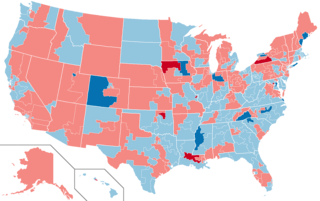
The 1986 United States House of Representatives elections was held on November 4, 1986, to elect U.S. Representatives to serve in the 100th United States Congress. They occurred in the middle of President Ronald Reagan's second term in office, while he was still relatively popular with the American public. As in most mid-term elections, the president's party — in this case, the Republican Party — lost seats, with the Democratic Party gaining a net of five seats and cementing its majority. These results were not as dramatic as those in the Senate, where the Republicans lost control of the chamber to the Democrats.

The 1984 United States House of Representatives elections was an election for the United States House of Representatives on November 6, 1984, to elect members to serve in the 99th United States Congress. They coincided with the re-election of President Ronald Reagan in a landslide. This victory also yielded gains for Reagan's Republican Party in the House, where they picked up a net of sixteen seats from the Democratic Party. Despite Reagan's extremely large electoral victory, the Democrats nonetheless retained a commanding majority in the House and actually gained seats in the Senate. These elections were the last until 2020 when a member of a political party other than the Democrats, Republicans, or an independent had one or more seats in the chamber.

The 1980 United States House of Representatives elections was an election for the United States House of Representatives on November 4, 1980, to elect members to serve in the 97th United States Congress. They coincided with the election of Ronald Reagan as president, defeating Democratic incumbent Jimmy Carter. Reagan's victory also allowed many Republican House candidates to secure elections. The Republicans gained a net of 35 seats from the Democratic Party. The Democrats nonetheless retained a significant majority, unlike the Senate elections, where Republicans gained control of the chamber. However, many Democratic congressmen from the south frequently took conservative stances on issues, allowing Republicans to have a working ideological majority for some of President Reagan's proposals during his first two years in office.
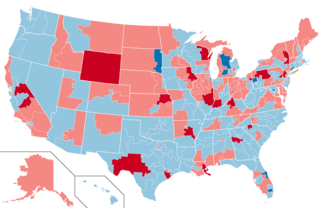
The 1978 United States House of Representatives elections was an election for the United States House of Representatives on November 7, 1978, to elect members to serve in the 96th United States Congress. They occurred in the middle of Democratic President Jimmy Carter's term, amidst an energy crisis and rapid inflation. The Democratic Party lost a net of 15 seats to the Republican Party, and thus lost their two-thirds supermajority, but still maintained a large 277-seat majority.

The 1974 United States House of Representatives elections were elections for the United States House of Representatives on November 5, 1974, to elect members to serve in the 94th United States Congress. They occurred in the wake of the Watergate scandal, which had forced President Richard Nixon to resign in favor of Gerald Ford. This scandal, along with high inflation, allowed the Democrats to make large gains in the midterm elections, taking 48 seats from the Republicans, and increasing their majority above the two-thirds mark. Altogether, there were 93 freshmen representatives in the 94th Congress when it convened on January 3, 1975. Those elected to office that year later came to be known collectively as "Watergate Babies." The gain of 49 Democratic seats was the largest pickup by the party since 1958. Only four Democratic incumbents lost their seats.

The 1970 United States House of Representatives elections was an election for the United States House of Representatives held on November 3, 1970, to elect members to serve in the 92nd United States Congress. They occurred in the middle of Richard M. Nixon's first term as president. His party, the Republican Party, lost a net of 12 seats to the Democratic Party, which thereby increased its majority in the House. Many viewed the results of the 1970 election as an indication of public fatigue over the ongoing Vietnam War as well as the fallout from the Kent State Massacre.

The 1968 United States House of Representatives elections were elections for the United States House of Representatives on November 5, 1968, to elect members to serve in the 91st United States Congress. They coincided with Richard M. Nixon's election as president. Nixon's narrow victory yielded only limited gains for his Republican Party, which picked up a net of five seats from the Democratic Party. The Democrats retained a majority in the House.

The 1960 United States House of Representatives elections was an election for the United States House of Representatives on November 8, 1960, to elect members to serve in the 87th United States Congress. They coincided with the election of President John F. Kennedy and was the first house election to feature all 50 current U.S. states.

The 1940 United States House of Representatives elections were elections for the United States House of Representatives to elect members to serve in the 77th United States Congress. They were held for the most part on November 5, 1940, while Maine held theirs on September 9. They coincided with President Franklin D. Roosevelt's re-election to an unprecedented third term. His Democratic Party narrowly gained seats from the opposition Republican Party, cementing their majority. However, the election gave firm control of the US House of Representatives and Senate to the New Dealers once again, as Progressives dominated the election.
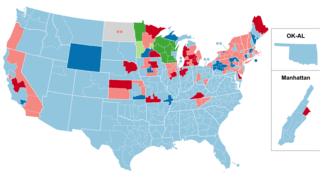
The 1934 United States House of Representatives elections were elections for the United States House of Representatives to elect members to serve in the 74th United States Congress. They were held for the most part on November 6, 1934, while Maine held theirs on September 10. They occurred in the middle of President Franklin D. Roosevelt's first term. The Democratic Party continued its progress, gaining another 9 net seats from the opposition Republican Party, who also lost seats to the Progressive Party. The Republicans were reduced below one-fourth of the chamber for the first time since the creation of the party. The Wisconsin Progressive Party, a liberal group which allied with the Democrats, also became a force in Wisconsin politics.

The 1920 United States House of Representatives elections were elections for the United States House of Representatives to elect members to serve in the 67th United States Congress. They were held for the most part on November 2, 1920, while Maine held its on September 13. They coincided with the election of President Warren G. Harding, the first time that women in all states were allowed to vote in federal elections after the passage of the 19th Amendment.
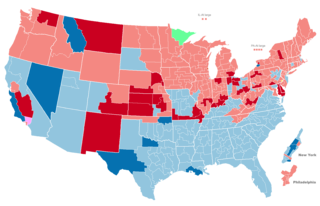
The 1918 United States House of Representatives elections were elections for the United States House of Representatives to elect members to serve in the 66th United States Congress. They were held for the most part on November 5, 1918, while Maine held theirs on September 9. They occurred in the middle of President Woodrow Wilson's second term.

1914 United States House of Representatives elections were elections for the United States House of Representatives to elect members to serve in the 64th United States Congress. They were held for the most part on November 3, 1914, while Maine held theirs on September 14. They were held in the middle of President Woodrow Wilson's first term.

Elections are held every year in the US state of Mississippi.
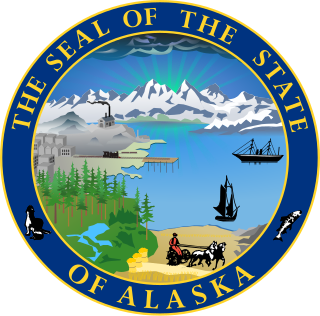
The number of elections in Alaska varies by year, but typically municipal elections occur every year, plus primary and general elections for federal and state offices occur during even-numbered years. Alaska has a gubernatorial election every four years. Members of the state's United States congressional delegation run for election or re-election at the times set out in the United States Constitution. Primary elections assist in choosing political parties' nominees for various positions. On a regional basis, elections also cover municipal issues. In addition, a special election can occur at any time.

The following is a list of federal, state, and local elections in the U.S. state of Maryland and can refer to one of the following elections:

This is a list of elections in the U.S. state of North Carolina.


















